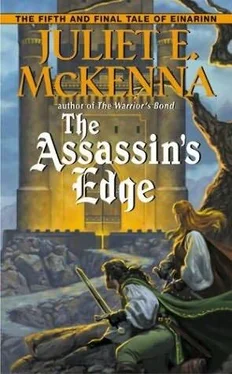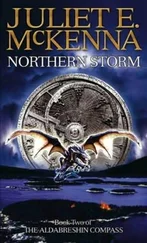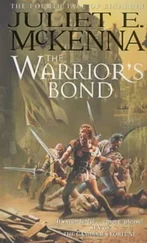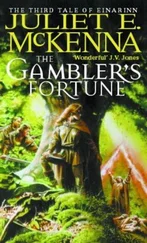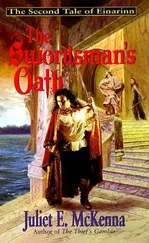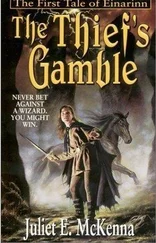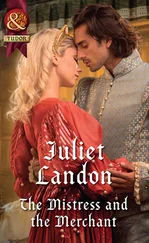’Gren coughed. ”Let’s go somewhere fresher.”
Beyond the gutting and salting, men and women were carving bigger fish into long fillets with wickedly sharp knives. More lads were hanging them on racks set to catch the wind while a gang of smaller children gathered discarded heads and spread them out to dry. An earlier harvest of stockfish was stacked flat beneath heavy stones and the last moisture drained slowly into a fishy slick coating the beaten earth, lapped at by eager cats just waiting for a chance to sneak closer.
A young woman saw me looking at the fish heads and paused in her work, bending a wrist to brush back a blond lock straying from her close-tied headscarf. “For winter, for the goats.”
“Ah, I see.” Then they’d even have milk that tasted of fish.
“You are visiting?”
“From the west.”
’Gren beamed back blatant appreciation of the shapely figure beneath her coarse and salt-stained bodice.
She would have replied but froze at a sharp rebuke from an older woman further along the stone workbench. ’Gren swept a bow to the sour old hag but she was intent on her filleting.
“Maybe you’d better rein in the charm,” I suggested as we strolled towards the distant edge of the settlement.
“You can’t ask that, not with so many fine-looking women,” he protested. “And precious few men to go around.”
He was right. “They’re all out fishing?” I guessed.
“Not at this time of day.” ’Gren shook his head. “Let’s see if these beauties have any answers.” We’d reached a high-walled enclosure holding more of the elusive goats. I was surprised to see how patiently they stood as girls combed the winter’s growth from their thick coats, filling baskets with soft tangles of woolly hair.
A buxom lass stood upright to ease her back and smiled shyly at ’Gren. Two other lasses looked up from their work with ill-concealed interest. “Good day to you.” ’Gren rested his chin on his hands atop the wall. “Don’t let me disturb you.”
An older woman, possibly the girls’ mother, certainly looking out for their interests, assessed him in much the same way she was sorting the hanks of goat hair.
I smiled at her. “That makes wonderfully soft blankets, doesn’t it?”
If I’d been a goat, she wouldn’t have treated me to any fish heads. ’Gren on the other hand was winning covert approval from all of them.
“See what you can get out of them without me around.” I slapped ’Gren on the shoulder, speaking in the gutter slang of Selerima. “I’ll meet you back at the keep in a while.”
’Gren nodded, his eyes on one lass bending forward to tease leaves from a goat’s shaggy forelock and artlessly offering him a fine view of her cleavage.
“We’re here to make friends, not babies,” I reminded him.
“I’ll stay chaste as a dowerless maidservant — until I know what the penalty for flipping a girl’s frills might be,” he added with a sly smile.
I poked him in the chest. “I was a dowerless maidservant, so you’d better stay a cursed more chaste than that.”
“I’m hardly going to tumble the first girl who flutters her lashes at me,” he protested. “Not when there are so many to choose from.”
“I’ll see you later.” Given how much ’Gren enjoyed flirtation, I judged I’d be back before he was ready to risk all our necks for the sake of some lass’s white thighs.
As soon as I turned my back, the girls all started talking. As long as he kept his wits out of his breeches, he was well placed to find out a good deal about this place.
The only thing beyond the goat sheds was the pond and the causeway. A narrow-windowed building stood solid in the middle of the rocky dam and closer to, I realised it was a mill. All I’d find there would be busy men who wouldn’t welcome interruption. Where might I find something useful like bored guards ready to gamble and gossip?
I walked idly back towards the keep, passing a building both open-fronted laundry and bathing house. Women pounded coarse, unbleached cloth in tubs filled from a spring that steamed as it bubbled up from the ground. On balance, I’d rather heave wood to boil my water than risk the ground melting beneath me for the sake of easier laundry. Unself-conscious as they stripped, girls were washing themselves clean after their fish gutting, pouring water over each other and soaping themselves with what looked like lengths of fatty hide. ’Gren would be none too pleased to have missed this treat but, given how obsessive these people were about cleanliness, I imagined he’d get another opportunity.
Other girls were giggling and chatting as they sat combing out their damp hair in the sun. I wondered about joining them but they were watching youths wrestling on a smoothed expanse of sun-baked clay. The lads were naked but for belts around their waists linked to leather bands around each thigh by plaited leather straps and a brief loincloth to prevent an opponent getting an unexpected handhold. The object seemed to be to drag your opponent off his feet by these straps. I spared a moment to appreciate the game as well as the players but decided the lasses wouldn’t welcome me.
Then I heard a hastily stifled giggle somewhere behind the laundry. A seemingly casual stroll took me round to a drying yard where shirts and blankets flapped in the breeze. I ducked beneath a swathe of sodden cloth and found a huddle of children shirking whatever tasks they’d been set. Some were throwing knobbly bones from some sizeable fish’s spine into a circle scored on the ground while others tossed a turnip studded with feathers between themselves. They all looked at me with vivid curiosity.
“Good day to you,” I said with a friendly smile.
“What’s your name?” asked a pert little girl with an upturned, freckled nose and dark eyes telling of mixed blood somewhere in her line.
“Livak,” I told her. “What’s yours?”
“Gliffa,” she answered promptly. “You’re not from here.”
“No, I’m not.” I swept a vague arm in the direction of the sea. “My people live in a forest that covers the land with trees taller than your houses.” That should intrigue youngsters from a land where trees rarely reached above knee height.
“What brings you here?” Gliffa was clearly a child always asking questions.
“I wanted to see the sea.” I shrugged.
“What happened to your hair?” demanded a small boy, his own locks close-cropped to little more than gold fuzz.
“Nothing.” I sat down, cross-legged. “It’s always been this colour, same as all my people.”
“Are you gebaedim?” the child asked suspiciously.
That was a word I’d caught last night. I shook my head. “What’s that?”
“Gebaedim live in the western lands.” One of the older girls leaned closer to study my hair and eyes. “They look like real people until they’re out of the sunlight. Then you can see they have shadow-blue skin and black eyes like a beast’s.” Smaller ones who’d been looking distinctly nervous relaxed at her authoritative pronouncement.
So Sorgrad had been right. I smiled again. “We call them the Eldritch Kin.”
“You’ve seen them?” The crop-headed lad’s blue eyes were awestruck.
“No one has, not in a long age.” I shook my head reassuringly. “We tell tales of them. Would you like to hear one?” That won me eager nods all round.
“There once was a man called Marsile who chased a hare inside an Eldritch man’s earthen fort. The Eldritch man made him welcome and offered him guest gifts.” The story of Marsile was one I could tell in my sleep and I gave the children the version my father had told me as a little girl, full of miraculous things like the leaf that prompted fish to throw themselves out of the water when Marsile tossed it into their pond, and the sprig of blossom that made him proof against any fire, even a dragon’s breath. My personal favourite was the purse that called coin to keep company with any he put in it.
Читать дальше
